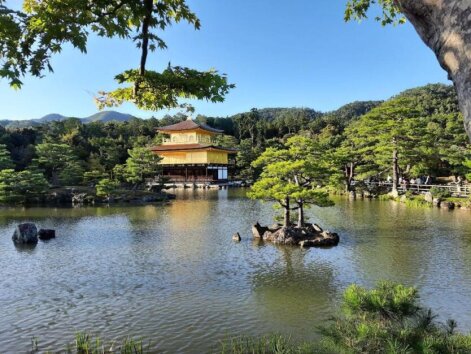The war started by Russia against Ukraine sharply raises the question of Ukraine's place in the architecture of the world. It is clear that it will change according to the outcome of the war. First of all, it is about the economic aspect as a resource foundation for other components, as well as about the role of our country in the security of the region.
Ukraine's new place will involve a different quality of international relations, a new level of interaction with key global players and the world's largest economies. With this in mind, the search for long-term partners and allies is the number one priority for Ukraine today, more than ever before.
Surprisingly, Japan, the world's third largest economy, with a GDP of $4.9 trillion, has been left out of the focus of attention by our political elites.
A G7 member who will soon chair this organization, one of the leading countries in the world, Japan is a country close to Ukraine not only because of unresolved Japanese territorial conflicts with Russia, but also because it is looking for new opportunities and allies in view of the growing power and threat from China.
Economic interaction between our countries is extremely limited. Foreign trade between Ukraine and Japan is mostly limited to small exports of Ukrainian raw materials, in particular grain and metallurgical products, and undiversified imports from Japan, focused on cars and some other machines. Despite a number of joint projects, in particular the construction of a terminal at the Boryspil airport and the long epic with the reconstruction of the Bortnitsa aeration station, which has been ongoing since 2015, the scale of Japan's capabilities and the potential of what Ukraine can offer do not correspond to the current level of cooperation between the countries.
In an extended interview in 2021, Japan's ambassador to Ukraine, Takashi Kurai, in a delicate manner typical of Japanese people, pointed out the main problems holding back economic cooperation between our countries. First of all, it is the slow course of structural reforms and an unfavorable taxation system. The politeness characteristic of the Japanese at the national level does not allow them to directly point out one of the main acute problems of Ukraine - all-consuming corruption, which the political elites are not even ashamed to raise to the level of international scandals. One of the main examples that affects Japan is the clearly corrupt appropriation of funds under agreements for the purchase and sale of quotas for greenhouse gas emissions within the framework of the Kyoto Protocol concluded with Japanese companies. Despite the fact that in the Eastern diplomatic tradition, such facts are not accepted on face value, they can cancel any prospects of cooperation.
At the same time, despite all existing internal problems of Ukraine, even during the war, Japan continues to provide our country with substantial humanitarian aid. This gives a chance to restart economic relations at a new, mutually beneficial level. However, in order to take advantage of this chance, Kyiv will certainly have to carry out radical reforms of public administration, and in some ways change its attitude towards partners and strategic partnerships.
Until now, Japan usually practiced so-called low-level support - financing projects outside of interstate agreements. Since 2002, the Japanese Government has been implementing about 10 such projects a year in Ukraine in various directions, including medical equipment for hospitals, educational projects, assistance to local communities, etc. Until recently, the most interesting advantages of Ukraine for Japan were the high level of technology and specialists in the engineering field, as well as a favorable geographical location.
However, in view of the large-scale transformation of the world market caused by the COVID-19 pandemic and then Russia's war against Ukraine, the situation is changing dramatically. Already now, leading industrial countries are reviewing the countries where production of critical components (for example, semiconductors) are located, not only for economic reasons, but also for security issues (the so-called friend-shoring). And here the opportunity for Ukraine lies in the fact that Japan has rethought its national security strategy, identified potential threats and now even plans to gradually double its defense spending. According to Japan's new security doctrine, it turns out that our countries have similar threats, and nothing brings us closer than common problems.
Therefore, Ukraine could become a strategic partner of Japan not only as a platform for technological production, in particular with a significant security component, for the European market, taking into account the bilateral Trade Partnership Agreement between Japan and the EU signed on July 17, 2018, which covers almost a third of global GDP. In the long-term perspective, our countries are quite willing to develop security and even military cooperation in view of the strategic threats they face.
Ukraine pays with the blood and suffering of its citizens for its commitment to Western civilizational values, but, unfortunately, it remains aloof from the tectonic shifts of the global economic system. It is clear that the focus of attention of the Ukrainian government is completely focused on today's war. However, we must look ahead. Ukraine must take the place in global economic processes that it rightfully belongs to in accordance with the values it defends in this war. And international economic relations between Ukraine and Japan are an important point in this direction.
Japan's openness to financing small projects, despite the complexity of their administration, opens the possibility for a wider interaction of associations of small and medium-sized businesses of Ukraine in terms of received project and grant financing from Japanese financial institutions already now.
Strategically, Japan is interested in infrastructure projects in Ukraine, as well as participation in its reconstruction after the war. Generally speaking, Ukraine has not yet positioned itself in international infrastructure projects, such as China's "One Belt One Road". However, given the growing confrontation between China and the United States, which is a strategic ally of Ukraine, and, to a greater extent, the neutral position of the Celestial Empire in the Russian-Ukrainian war, the implementation of such initiatives is unlikely to be appropriate. However, China is not the only global player in the implementation of systemic infrastructure projects. Since 2011, Japanese embassies and consulates generally have been designated as "liaison officers" for infrastructure projects. As of 2017, 200 diplomats in 73 countries of the world were engaged in the development of this field.
The Japanese economy operates at a high technological level with an extremely low unemployment rate and a constant employment rate that, despite minor fluctuations, has not changed over the past 5 years. It lacks human resources to achieve high rates of development. Given that the world is on the threshold of a new technological order, given Japan's significant technological potential, it needs a testing ground for new technologies, a source of inspiration for their production, and a quality workforce that can implement it all. The Land of the Rising Sun can find all this in Ukraine. And in view of the correlation of the security interests of the Japanese and Ukrainians, there are minimal risks that the potential cooperation between our countries will be destroyed due to the reversal of Ukraine's geopolitical vector.
Therefore, on the condition that structural reforms are carried out in Ukraine, strategic cooperation between Ukraine and Japan can become a win-win scenario for the development of events for both countries.
Despite the huge difference between cultures and colossal distances, Ukraine and Japan have much more common strategic interests than it might seem at first glance. In order to become open to Japanese cooperation and investment, Ukraine needs a deeper and more thoughtful approach to a partner that has already experienced the post-war destruction of the economy, rethinking its place in the world and rapid economic growth, which made Japan one of the countries - the undisputed world leaders.

























